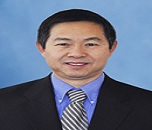
Guoan Chen
University of Michigan Health System, USA
Title: Functional and mechanistic analysis of LncRNAs in lung cancer
Biography
Biography: Guoan Chen
Abstract
Lung cancer is a molecularly-heterogenous disease and the leading cause of cancer mortality. The molecular basis for this clinical heterogeneity remains incompletely understood. Increasing appreciation of the role of long non-coding RNAs (lncRNAs) in cancer progression has led to the identification of these molecules as a largely uncharacterized aspect of disease biology and novel prognostic/diagnostic biomarkers. We recently generated transcriptome data using next-generation RNA sequencing (RNA-Seq) to reveal lncRNA expression patterns in lung cancer. Preliminary studies have identified several novel lncRNAs which were dysregulated in lung cancer. LINC00857, as one of the top dysregulated lncRNAs, was highly expressed in lung cancer and significantly related to poor survival in patients with lung adenocarcinomas. This was verified by several lung data sets and confirmed by RT-PCR in an independent data set. Functional studies of in vitro and in vivo models indicated that LINC00857 plays an important role in lung cancer proliferation, invasion and cell cycle regulation. Mechanistic studies indicated that LINC00857 mediated tumor growth potentially through regulation of autophagy via YBX1-MET/AMPKa axis in lung cancer cell lines. The study provided a comprehensive analysis of lncRNAs in lung adenocarcinomas. It established the role of LINC00857 as a potential driver of lung cancer pathogenesis and a potentially as a new diagnostic/prognostic biomarker. Importantly this study may help identify new molecular targets or a predictive marker for lung cancer treatment in tumors with TP53, KRAS or EGFR mutations, as well as ALK fusion.

